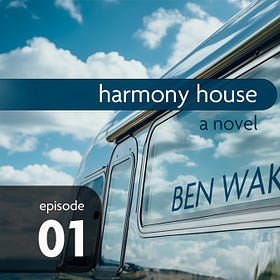Writing a Dam Novel
and the perils of "arriving"
There’s a strange thing that happens when you learn how to do something hard. You think you’ve arrived, and arriving is kind of terrible because it means there’s nowhere left to go. Arriving for an artist of any kind is tantamount to death.
When I say “arriving” I don’t mean having a best-selling novel because 99% of us will never experience that. I mean the subtle, insipid feeling of “mastery” one gets after reaching a milestone like finishing a novel. It’s an incredible dopamine hit and deserves to be enjoyed but like most drugs it has side effects. For me, those side effects have presented as overconfidence which can lead to complacency which inevitably leads to disconnection and boredom.
One of the best ways I’ve found to prevent this from happening is try to forget everything I thought I knew about writing. I seek out unfamiliar and even uncomfortable ideas before I begin a new project. But it’s never actually seeking out ideas as much as just letting them in. This isn’t an original concept. It aligns closely with the Buddhist philosophy of the beginner’s mind. But it’s nothing so academic or lofty as that. It’s just about pausing my agenda long enough to let something else in. I can read any number of writers and I suddenly feel like a child, like that book I was so proud of has all the depth and complexity of some macaroni and yarn pasted on construction paper. The ego simpers and limps around for a few days but then something wonderful happens. There’s an awakening to the understanding that I’m at the bottom once more and there’s now an opportunity to discover the path through a novel all over again.
Wading into the Current
When I started work about six weeks ago on this new project which will (hopefully) be my sixth novel, I began with this informal mental exercise I’ve done for the past three books. I say informal, because it’s a game of pretend like children do. I don’t sit down and make notes or craft an outline. I don’t talk with ChatGPT. I walk and listen to music. I read. I sit and observe. I let my mind wander wherever it wants to go, collecting and sifting with no real goal in mind.
Eventually, something will snag like a twig on an outcropping of rocks in a river. I’ll examine this idea that could be anything from a setting, a snippet of dialog, a character I encountered at work, an event, or a philosophical quandary. Sometimes, it stays for a while but then it slips loose and goes downstream. But soon enough, one of those twigs will defy the rushing current and find purchase, and then it will snag another branch, this one with some leaves on it. I don’t invest too much in this little dam until a piece of trash gets snagged and then I have to wade in and pluck it loose. Now I’m in waist-deep and have to be a little more committed. I reach around for some loose rocks in the riverbed, ideas that are always there in my subconscious and I pull them to the surface so I can anchor the branches. Maybe I’ll pull a few fistfuls of silt and sludge from the bottom to use as a kind of mortar. These are smaller, slipperier ideas that are more loosely held but great at filling in gaps.
Before I know it, the current has brought me the gift of other flotsam and jetsam that happily find a place in my burgeoning contraption or they’re so compelling that I’m motivated to swim after one or two that slip by so I can bind them into this thing I’m making. These ideas are the most important because they’re the ones I didn’t ask for and maybe never cared about before they floated into my reach.
If you’re following along and indulging me in this extended metaphor, you’ll see that I’m building a dam which would seem counter intuitive. Shouldn’t things flow? Isn’t that what we strive for, flow? The answer is yes, but not yet.
The bigger I can build the dam, the more water builds up behind it. This watershed of ideas mounting is potential energy— a force, that when finally set loose, has the ability to propel my story forward stronger and faster than if I had just started writing when there was nothing but a curious twig caught between some rocks.
Enough with the Dams! How does it work?
Metaphors are great, but it might be useful if this was grounded in something more tangible so I’ll attempt to illustrate how this worked in the writing of my fourth novel, Harmony House.
The first twig came to me during the pandemic when I was stuck at home. I fantasized about having a piece of land in the mountains where I could build a little community of tiny homes that everyone I love could come and stay. I wasn’t writing a novel, I was fantasy window shopping and, in the process, discovered a cottage industry of companies that make prefab eco homes. I fell in love with the idea of living off the grid in a sustainable way.
The second branch was a cluster of ideas all around what was happening in America with George Floyd and Black Lives Matter, corporate virtue signaling, and DE&I initiatives. All this was filtered through my consulting day job as I managed a team of fifteen folks all working in pajamas from their own quarantine bubbles. I began to imagine the kind of delicious tensions that could arise if you threw six individuals together in a small space who were selected objectively for their relative diversity like a stock photo on a healthcare provider website.
The river rocks that sit at the bottom of my subconscious are always there, just below the surface, waiting for the chance to weigh in. I hoisted a few of my favorites like corporate overreach and the sins of capitalism, gender, the specter of technology, and the enduring hope that human kindness can overcome most things. I think of these as rocks, because they tend to be heavy and can put undue burden on a story if not balanced by more entertaining and less preachy themes.
The flotsam and jetsam for Harmony House drifted in as it always does when I’m writing— little bits and bobs from overheard conversations, a curious fact learned while listening to a political podcast, or a memory of the way the last rays of sunlight make the tall grass in a high meadow in the North Carolina mountains glow. These small pieces fall into place just in time, effortlessly, and almost always make the story better, lighter somehow.
The rest is the work of writing which is not mysterious as you know if you’re a writer. You show up, you sit in the chair and lean forward working to stitch everything together as tightly as you can, all the while knowing there will always be a leak. It’s an imperfect business but you do it until it’s done. Knowing when it’s done is probably the hardest thing. But you end it because you must and in that ending, you arrive and must figure out what all that was for and worse, what to do with it. This is my least favorite part. I think the incredibly gifted and prolific writer, Percival Everett said it best in a recent interview on the Talk Easy podcast.
I call it the Mama Bear school of art. When I’m finished with a book, I push it away and if it can eat and survive, well that’s great but it cannot come back to the den. My job is to move on to something else. — Percival Everett
Let’s Hope We Never Get There
So, never stop moving— this is my strategy, at least for now. A few years back, I convinced a successful writer to read my second novel in hopes that he would give me some helpful feedback or even better, that he might love the book and introduce me to his literary agent. He didn’t do either, but he did say one thing a couple of months later when we met up for drinks and he asked how the edits on that novel were coming along. I told him that I had shelved it and started a third book. He laughed and said: “Well, you can keep rewriting one book over and over for ten years like me or you can keep writing new ones. Either way you’re going to get better.”
All this to say, you must find what works for you. There’s no one way to be a writer and anyone who tells you otherwise is likely trying to sell you a book on writing.
How does it work for you?
The best part about publishing these little essays about writing and the creative process is getting to hear how other writers and artists like you do it.
How do you decide what to make?
When do you know you have what you need to begin?
What’s the hardest part?
How do you know when you’re done?
If you survived the dam metaphor and were intrigued about the novel, Harmony House I was describing, you can read or listen to the first couple of chapters free. I’ve linked to the first chapter below.
A Deal is Brokered in a Sweat Lodge
Welcome to the beginning of my new serial novel! I hope you’re ready for a fun ride together. New episodes will drop every Tuesday morning. All episodes will be free to read for the first three months before they go into the paid archive. Enjoy the first two episodes for FREE.





Dam good metaphor. (Sorry, I had to.)😂 I entirely relate to the initial stage of non-writing. Whenever I begin a new In Defense of, I spend a good three weeks wandering around with it in my head, holding it loosely, letting it go, returning to it with fresh eyes, exploring it through all my senses (and especially mixing those senses up with synesthesia—I think that’s my most favorite part. It’s so fun to experience a topic through a sense that makes no sense!)
Fun to hear some bts on Harmony House. There are so many pebbles in that Great Lake mind of yours, it’s fun to imagine which ones are surfacing now.
What an interesting peek behind the curtain of your process!
I’ve never written a novel, and am not sure it would ever be my thing, but I love to read. I love being caught up in a story so rich that I hate putting it down. This happened in your most recent book. I couldn’t bear to move slowly each week with one chapter, so I saved them up and listened to three or four in a row.. ahhhhhh. That was satisfying.
I love that your friend encouraged you to keep writing.
I’ve noticed with many artists (of all genres) that there is a struggle to know when the completion has arrived. I imagine it’s something you just sense? What helps you know when a chapter or a book is complete ?